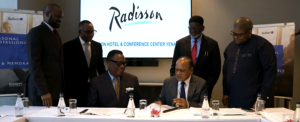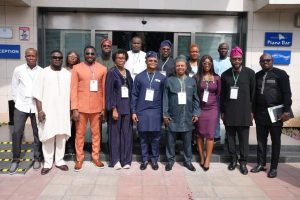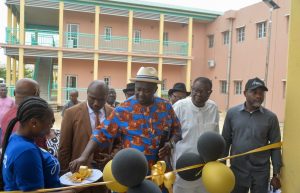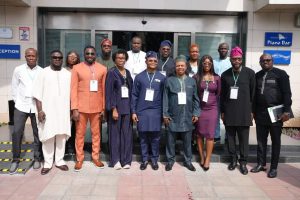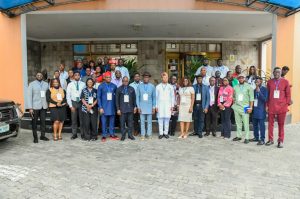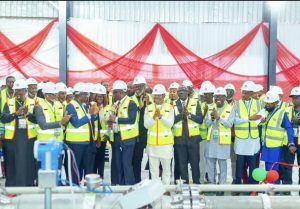
The Nigerian Content Development and Monitoring Board (NCDMB) has been commended for its sustained engagement with communities and groups in oil- and gas-producing areas through structured programmes of enlightenment and leadership training.
NCDMB’s Executive Secretary, Engr. Simbi Kesiye Wabote, and General Manager, Corporate Communications and Zonal Coordination, Dr. Ginah O. Ginah, received exceptional approval rating from the Movement for the Survival of IzonEthnic Nationality in the Niger Delta (MOSIEND) at a 4-day training workshop in Uyo, Akwa Ibom State.
 Declaring the workshop open on Tuesday, Dr. Ginah took the National Executive Council (NEC) of the body through NCDMB’s Community Content Guideline, a set of ground rules distilled from the Nigerian Oil and Gas Industry Content Development (NOGICD) Act, 2010, which specifies, among other things, benefits host communities could legitimately expect from oil and gas companies.
Declaring the workshop open on Tuesday, Dr. Ginah took the National Executive Council (NEC) of the body through NCDMB’s Community Content Guideline, a set of ground rules distilled from the Nigerian Oil and Gas Industry Content Development (NOGICD) Act, 2010, which specifies, among other things, benefits host communities could legitimately expect from oil and gas companies.
Among the objectives of the Guideline are, “Structured engagement of youths in host communities in productive endeavours including employment, training, services, supplies…” and the establishment of critical infrastructure “to stimulate development in host communities.”
According to him, “The NOGICD Act has six key thrusts.” The first of these is, “Integrate oil and gas producing communities into the oil and gas value chain.” Next, “Maximise participation of Nigerians in the oil and gas industry.” An oil and gas company, he explained, is required to establish a project officein a catchment area. In some cases it is a community office that has to be established.
Another thrust relates to employment. The Guideline, he explained, seeks to ensure that indigenes of the communities are “gainfully employed” and “earn a living wage from their labour.” All unskilled job roles (e.g. cleaners, porters, grass cutters, etc.) are for indigenes, while at least 50 per cent of semi-skilled job roles and 10 per cent of skilled job roles are also for them.
In procurement of goods and services and choice of contractors for projects and supplies, there are rules that have to be followed by companies as well. To ensure strict compliance a mechanism known as Host Community Verification Exercise is organised by the Board from time to time to ensure that contractors for certain categories of jobs are from host communities.
Explaining further, he said, “NCDMB partners reputable financial institutions to offer funding support from the Nigerian Content Development Fund to host community business entities to finance purchase orders (PO) and to establish new businesses.”
Infractions, he emphasised, should be reported to NCDMB, just as he advised that community youths should never take laws into their hand. He also charged MOSIEND and other groups and activists in oil- and gas-producing communities to study the Community Content Guideline, so as to eliminate avoidable conflicts with companies.
MOSIEND President Kennedy T. West said the training for MOSIEND Executives, sponsored by NCDMB, has profoundlyenriched their knowledge of leadership and its associated responsibilities, noting that they were learning so many things for the first time.
“The struggle for equity and justice in the Niger Delta he lamented, “has suffered setbacks” because of what he termed “leadership deficit.” According to him, “We are unable to manage our success,” a situation he attributed to limited grasp of the intricacies of a struggle such as that of oil- and gas-producing communities.
Citing widespread vices such as illegal bunkering and refining of crude oil and piracy, the MOSIEND leader suggested to the NCDMB Management to extend the training to zonal and clan executives of the Movement as they function at the community level, where the activities take place, and could be effective in reorienting youths that are so disposed.
The MOSIEND President said, “A training like this can help nurture healthy social habits” and assured the NCDMB that MOSIEND would strive “to rebrand and market the Niger Delta” for the good of its people.
The key resource person, Mr. Olumide Ajomale, expressed appreciation to the NCDMB for the opportunity it provided the MOSIEND NEC, while corroborating sentiments voiced by others on changing the narrative of the Niger Delta. He told the gathering, “Today, it’s no longer muscle, no longer brawn; now it’s engagement,” which as he explained requires sound judgment, negotiation skills as well as communication skills.
Discover more from Nigerian Content Development & Monitoring Board
Subscribe to get the latest posts sent to your email.

